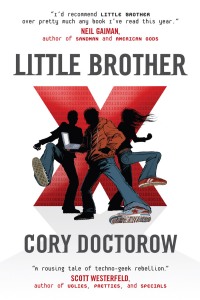“I can’t go underground for a year, ten years, my whole life, waiting for freedom to be handed to me. Freedom is something you have to take for yourself.” – Marcus Yallow
As a teacher, I see the current teen culture close up on a daily basis, like an anthropologist studying an aboriginal tribe in the middle of South America. One of the things that I keep seeing, in my daily excursion into the deep dense jungle that is middle school, is a strong sense of apathy, of laziness, a real sense of kids thinking “Who cares?”. This is a problem because these teens are being trained to accept the world around them without analysis, without skepticism. They hear that their clothes come from a sweatshop in Indonesia, oh well…They see that the chicken they eat is injected with so many hormones that they can’t even walk like normal animals and they say, oh I love them with honey mustard…or they find out that the government is tapping their phones and logging their search histories online and they just shrug and say, I don’t care if they know what I look at. The world around them slowly drifts closer and closer to a Orwellian society and, because of their malaise, they just look up from their screens with a blank stare and continue texting their friends. Social activism is dying and the world of rebellion, the world of sit-ins and protests is falling by the way side. So when I find a book like Cory Doctorow’s Little Brother, a book about social activism, a book about standing up for your freedom in the face of an unjust government, I don’t put that book down easily.
Marcus Yallow and his friends are a group tech savvy gamers who chose to skip school on the wrong day. A terrorist attack on the Bay Bridge in San Francisco leads to them being captured and detained by the Department of Homeland Security. Marcus refuses to cooperate with the DHS and so they decide to inflict him to prison intimidation tactics to get information from him, as they think he may know something about the terrorist attacks. Once he is finally released, Marcus is so infuriated that he becomes hell-bent on getting revenge on the DHS for treating him so unfairly and for not releasing his best friend, Darryl, who had been stabbed just before they were picked up by the DHS.
The story revolves around the theme of social activism as Marcus begins a cyber-guerrilla war against the DHS and the security checkpoints they begin installing throughout the city. He begins an online movement through a protected internet called XNet, where he teaches other teens how to scramble DHS trackers, protect their information, and generally make life for the DHS harder. Doctorow shows the dangers of social activism under a police state, but also the reward of knowing your beliefs and fighting for you right to speak your mind and be free. Marcus ends up butting heads with police, with his vice principal, and with the DHS on numerous occasions, as he fights to maintain his freedom in a city with an ever-growing police presence.
The book also has a lot of computer tech references that sometimes bog down the prose for a less than tech savvy plebeian like myself. The book is also set in the very near future and references some technology that I have never heard of, so I assumed it was fictitious, which was also slightly confusing. Marcus spews computer hacking terms and encryption techniques like he is teaching a class on computer science, which I found to draw me out of the narrative. But for a student that is into coding, this jargon may be exactly what will keep them hooked in the story.
I definitely enjoyed Little Brother, and there were moments where I struggled to put the book down. The story was very engaging and I often found myself needing to know what happened next when Doctorow left me with a cliffhanger at the end of a chapter. But it is a thick book, which may scare away some students who are interested in technology and computer sciences, but are not avid readers. I would use this as part of a lit circle, but I would recommend using it with grade 9 or higher, as there is some language and sexual content in the story. I would pair this book with Rae Mariz’s The Unidentified, Feed by M.T. Anderson, or James Dashner’s The Eye of Minds, as they all deal with a tech world and the fight against an oppressive system and the activism it takes to rid yourself of their control. Little Brother is a fantastic story for lovers of computer science, social activism, or just plain bringing down the man.
